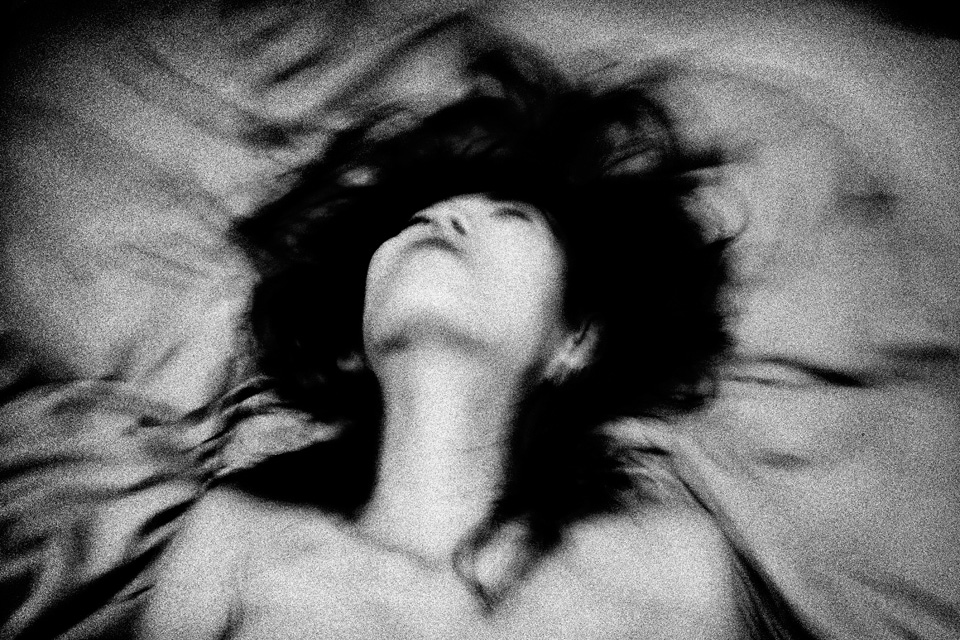She invites us to come in and hides the child in the next room. I don’t manage to see if it’s a boy or a girl, I hear just a quick “Mom!” The mom replied with a command to go do the school homework. It is dark in the room. The window is closed with blinds. There are two beds, L-configured, apparently the child sleeps here too. On a small table there’s a disarray of a lamp, a burner and syringes. Three guests are spread on the beds.
{“img”: “/wp-content/uploads/2015/04/dagata01.jpg”}
{“img”: “/wp-content/uploads/2015/04/dagata02.jpg”}
I am with Antoine d’Agatha. This is the third day we’ve been driving around the city, looking for stashes to shoot video portraits of prostitutes, drug addicts and HIV victims.
While we are putting up the tripod and getting the equipment ready for shooting, one of the guests starts fussing around with some pills, squeezing them into a small cup. He had come with us. He is 33, from which he spent 17 years in jail, all because of those pills and syringes. In a few minutes everything is ready for filming. The burner flashes ablaze, and the eyes of those gathered in the stuffy room ignite with anticipation. So here it is: the liquid is ready, the syringes are filled.
Antoine is focused on the apartment owner. She has just sent some “bliss” up her vein. Now she is on the other side of the reality — together with nearly all of d’Agatha’s characters. Blood oozes from the mosquito bites; the guests’ pupils are rolled behind the horizon; time has stopped; eternity has been compressed into minutes. Those minutes are to enter Antoine’s new film — about women and their unchained desires, about human flesh.
{“img”: “/wp-content/uploads/2015/04/dagata03.jpg”},
{“img”: “/wp-content/uploads/2015/04/dagata05.jpg”}
{“img”: “/wp-content/uploads/2015/04/dagata041.jpg”}
I go out, bade farewell to the film protagonists, look at my watch and can’t believe it – just 15 minutes? Incredible! I spent an eternity in that apartment! D’Agatha lives in that eternity. “I construct a situation where the most important thing for me is not to miss anything.” And I realise that he created that apartment and all its guests, guided by one and only wish – to be part of the self-destruction process.
As a young man, d’Agatha became interested in Communist ideas and went to Africa, but got bogged in alcohol, drugs and other forms of abuse. But one day he met a photographer with AIDS who was fixing on camera every minute of his life. Friendship with that person inspired Antoine d’Agatha to leave the slums and go to New York where he seriously took up photography. Larry Clark and Nan Goldin were his guides into that world. But Antoine went further. He stopped being a tourist with a camera in the world of “human flesh” he became part of that flesh, a piece of meat that the chewers might choke on. D’Agatha has shown that death of an overdose or the terminal phase of AIDS are normal, the same as sex with a Thai prostitute. That in a prostitute’s eyes there is an infinity, there is hell and there is paradise. And the partition between the hell and the paradise is eroded to the degree where the viewer can see both sides at the same time.
Anarchist from Marseille, Antoine d’Agatha doesn’t conceal anything about himself and doesn’t make any proclamations. He talks with bitterness — both about his life and his photography. He doesn’t use many words, but he makes himself very clear. He looks into the void, burning it with his glass eye, telling tales of Thailand, Cambodia and Europe, of situations that he created for innumerable self-destructions. His gaze thrust into a strip-club floor, lowers his vodka glass on the table and says quietly, “It’s a pity when you go through something really intense — something you built with drugs, alcohol and prostitutes — but something you are unable to capture. How many times I gave the camera to people asking them to photograph me at the peak moments. And then I looked at the images to see just feet, a fragment of a sheet, or a mattress.”
{“img”: “/wp-content/uploads/2015/04/dagata06.jpg”}
{“img”: “/wp-content/uploads/2015/04/dagata071.jpg”}
{“img”: “/wp-content/uploads/2015/04/dagata081.jpg”}
With d’Agatha I constantly felt some kind of a strain. Not fear, but a mixture of admiration, pity and respect. Respect for the person who turned photography into his own language, understandable only for himself. “I sent hundreds of films to Paris when I was in Asia. They were developed and archived. I never saw those negatives, and I am no longer interested.” He easily forgets his own “quotes.” D’Agatha just keeps shooting — as if for the first time.
Experiments with his own body and consciousness have often brought Antoine to rehabs. In a submissive way he did everything the doctors told him to, for half a year went without touching drugs. But, by his own words, he never seriously considered quitting. There are still situations that haven’t been created, sufferings that haven’t been suffered, and teeth strong enough to chew up that “piece of flesh.”
{“img”: “/wp-content/uploads/2015/04/dagata09.jpg”},
{“img”: “/wp-content/uploads/2015/04/dagata101.jpg”},
{“img”: “/wp-content/uploads/2015/04/dagata111.jpg”},
{“img”: “/wp-content/uploads/2015/04/dagata12.jpg”}
Text: Ivan Chernichkin
Photo: Antoine d’Agatha/Magnum Photos.





